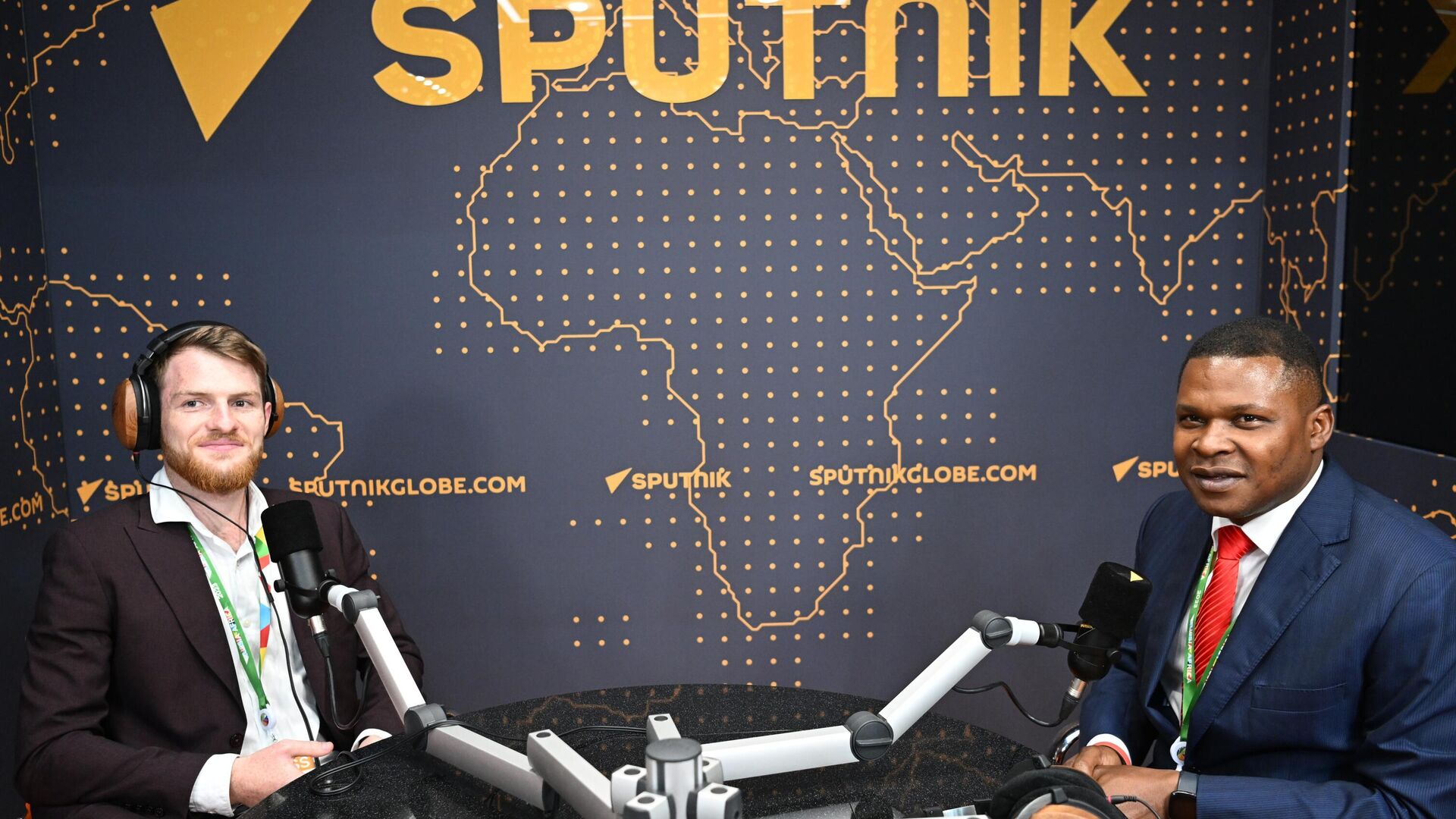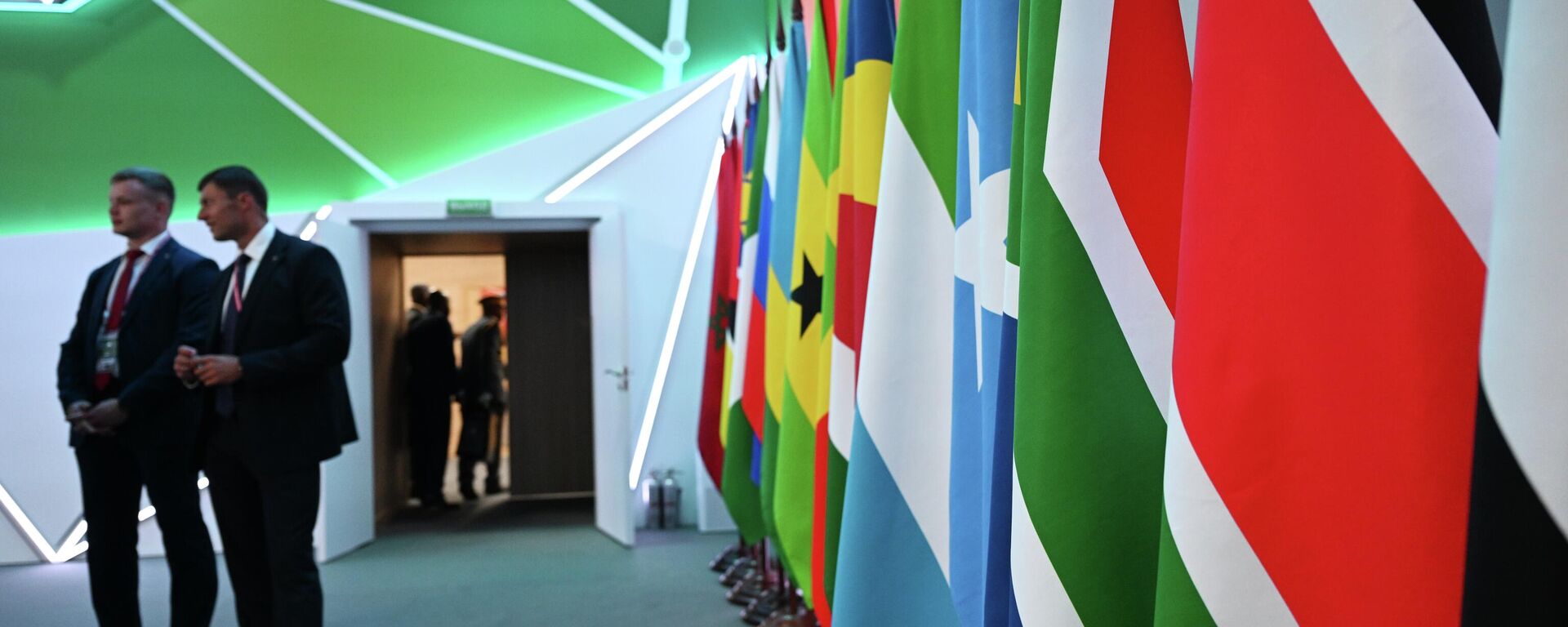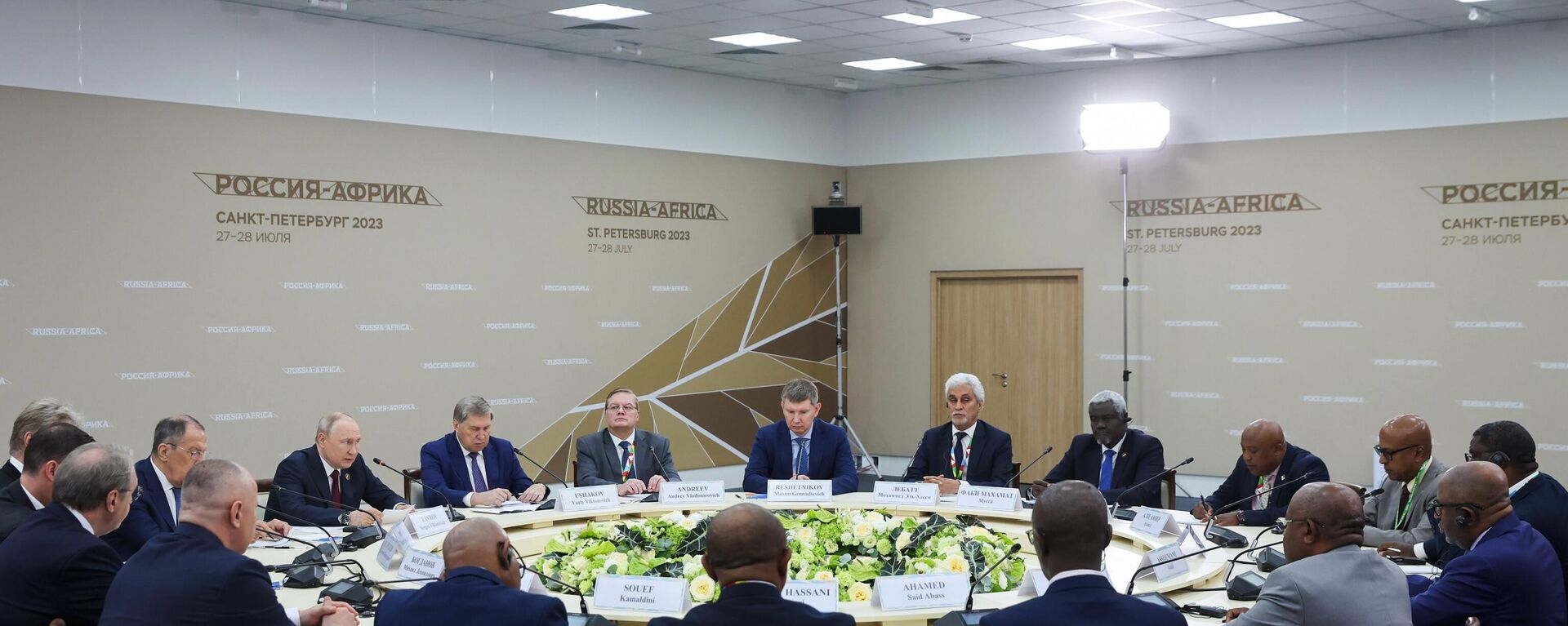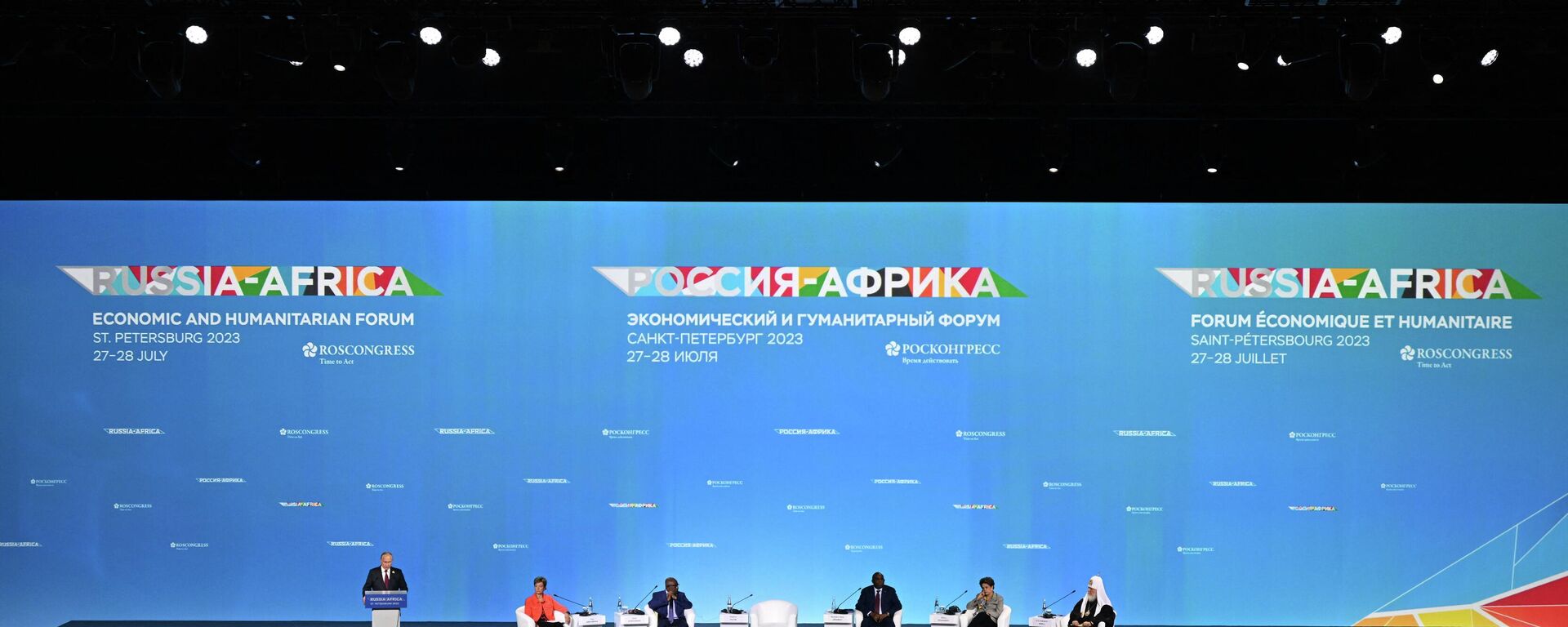https://en.sputniknews.africa/20230729/a-good-start-african-energy-chamber-chairman-really-impressed-with-russiaafrica-summit-1060905493.html
'A Good Start': African Energy Chamber Chairman 'Really Impressed' With Russia–Africa Summit
'A Good Start': African Energy Chamber Chairman 'Really Impressed' With Russia–Africa Summit
Sputnik Africa
NJ Ayuk, the executive chairman of the African Energy Chamber, made the remarks following the second Russia–Africa Summit, held in Russia's St. Petersburg on... 29.07.2023, Sputnik Africa
2023-07-29T17:24+0200
2023-07-29T17:24+0200
2023-07-29T18:49+0200
second russia–africa summit
russia
russia-africa summit
africa in details
nuclear fuel
south africa
southern africa
cooperation
russia-africa cooperation
west
https://cdn1.img.sputniknews.africa/img/07e7/07/1d/1060906024_0:176:3016:1873_1920x0_80_0_0_cf5a58617076c7219a01bf79813d2f6c.jpg
The second Russia-Africa Summit turned out to exceed everyone's expectations, NJ Ayuk, the executive chairman of the African Energy Chamber, told Sputnik Africa.Ayuk stressed that the issues touched upon during the event were just what the Africans wanted to hear and to talk about.He outlined a positive impact of the discussions on financing and, in particular, on the BRICS Development Bank.According to the official, some are enthusiastic about both the continent and Russia, as both partners have a "unique" history of relationships, face the same issues.NJ Ayuk stressed that he has been impressed by the Russia-Africa Summit.As for Ayuk’s anticipation of the achievements following the Summit, he stated that the Africans are willing to draw Russia's producers suppliers and technology, in order to eliminate the continent’s "energy poverty."The official pointed out Russia’s experience with energy, outlining the fact that it is managing to use its fuel reserves to power the country.According to him, today Russia's results in terms of wheat exports, as well as its industrial development, are "inspiring".Speaking of the main challenges faced by Africa, Ayuk mentioned financing limitations, stressing that the continent now has to face injustice from the West in the financial sphere.On the other hand, representatives of Russian gas and oil companies show the better path of that economic branch’s development.In this regard, the African Energy Chamber chairman outlined the idea that the Russian side’s representatives delivered to the Africans.As for the further development of Russia-Africa energy relations, he noted that as during the second Russia-Africa Summit he has witnessed discussions on various projects, many agreements are expected to be signed.NJ Ayuk emphasized that with the help of the Russian side, the Africans are planning to involve its companies in "technology transfer."Above other issues, the official also mentioned the significance of the Africans gaining skills, and the youth in particular, which is highly important for the continent.Speaking of Russia’s southern African partner – South Africa – and its energy state, the official outlined that now the nation needs nuclear energy, the country has already undertaken steps on that very path.Touching upon the issue of Russia-Africa nuclear interaction, NJ Ayuk stressed that the continent usually faces "resistance" when Russia offers its assistance in the sphere.Nevertheless, according to the official, today’s world is "open," the African continent is not subjected to any colonial influence from other nations, as it used to be.He recalled Russia’s role in liberating the African continent from the western colonizers, outlining that no one today can tell the Africans to "turn away" from its partner.
https://en.sputniknews.africa/20230729/russiaafrica-forum-outcomes-action-plan-20232026-1060896627.html
https://en.sputniknews.africa/20230729/african-leaders-discuss-ukraine-initiative-with-putin-statement-being-prepared-1060892027.html
https://en.sputniknews.africa/20230729/second-russiaafrica-summit-full-final-declaration-1060891753.html
russia
south africa
southern africa
west
Sputnik Africa
feedback@sputniknews.com
+74956456601
MIA „Rossiya Segodnya“
2023
News
en_EN
Sputnik Africa
feedback@sputniknews.com
+74956456601
MIA „Rossiya Segodnya“
Sputnik Africa
feedback@sputniknews.com
+74956456601
MIA „Rossiya Segodnya“
russia, russia-africa summit, africa in details, nuclear fuel, south africa, southern africa, cooperation, russia-africa cooperation, west, colonialism
russia, russia-africa summit, africa in details, nuclear fuel, south africa, southern africa, cooperation, russia-africa cooperation, west, colonialism
'A Good Start': African Energy Chamber Chairman 'Really Impressed' With Russia–Africa Summit
17:24 29.07.2023 (Updated: 18:49 29.07.2023) NJ Ayuk, the executive chairman of the African Energy Chamber, made the remarks following the second Russia–Africa Summit, held in Russia's St. Petersburg on July 27-28. The historic event was attended by African leaders, renowned politicians, representatives of regional associations, the media, and organizations from all over the continent.
The second Russia-Africa Summit turned out to exceed everyone's expectations,
NJ Ayuk, the executive chairman of the African Energy Chamber, told
Sputnik Africa.
"The summit came out better than expected. The African delegations showed up bigger and better," he said.
Ayuk stressed that the issues touched upon during the event were just what the Africans wanted to hear and to talk about.
"I participated in the opening sessions, where I watched the plenary session meetings. It was even, it spoke to the core issues about what Africans really want. Economic justice discussed, the big role of gas discussed by President Putin and talked about what Russian [gas and oil] companies like Gazprom, Lukoil, Rosneft, RusBashNeft are doing across Africa. He mentioned the countries that you're operating in and a willingness to commit to more. But also, words were also important," he stated.
He outlined a positive impact of the discussions on financing and, in particular, on the BRICS Development Bank.
"It was the discussions around financing. Former President Dilma [Rousseff] of Brazil, who leads the BRICS bank, being able to lay out a clear framework on how the BRICS bank is going to function. And with that, an Africa that is big. And Professor Oramah of Afrexim[bank], [and] having those discussions is really good," Ayuk shared .
According to the official, some are enthusiastic about both the continent and
Russia, as both partners have a "unique" history of relationships, face the same issues.
"But I think there is some enthusiasm in the air with Africa and Russia because we've always had a unique relationship, and they just want to take and take it more. And I like that. I like that we built a coming together, but also dealing with key issues like wheat, food to ensure that Africa's food security is going to be better forefront, and we can start producing more," he said.
NJ Ayuk stressed that he has been impressed by the Russia-Africa Summit.
"So it's been a good start. And I'm really impressed by what we see," he outlined.
As for Ayuk’s anticipation of the achievements following the Summit, he stated that the Africans are willing to draw Russia's producers suppliers and
technology, in order to eliminate the continent’s "energy poverty."
"Let's not forget, 600 million Africans don't have access to electricity; 900 million don't have access to clean cooking technologies, most of them women. We need to instill that as a human rights issue. But, being able to provide affordable, reliable baseload energy for Africa is so key," the official explained.
The official pointed out Russia’s experience with
energy, outlining the fact that it is managing to use its fuel reserves to power the country.
"So, you're looking at Russia, you've seen how they've been able to use gas to power Russia. They've been able to use gas to build industries. They've been able to use natural gas to really drive up petrochemicals, urea, ammonia and fertilizer plants and then transformed that into agricultural bases where 20 years ago, Russia was a net importer of food," he stated.
According to him, today Russia's results in terms of wheat exports, as well as its industrial development, are "inspiring".
"Today, Russia is exporting one-third of the wheat across the world. That is something that is inspiring, and we would expect that Africa could transform itself using natural gas, Russian technology, Russian skill sets, Russia's know-how to transfer that and build and have a petrochemical industry like what the Russians have built and then build agriculture industry so that we can feed ourselves," chairman of the African Energy Chamber said.
Speaking of the main challenges faced by Africa, Ayuk mentioned financing limitations, stressing that the continent now has to face injustice from the West in the financial sphere.
"The biggest challenges right now is the chokehold on financing. We hear it from wealthy countries telling us that we should leave the gas in the ground, we are not going to finance gas. And that is big for Africa. You know, you cannot tell the poorest countries that you can’t finance. […] Yes, the chokehold on financing that we've seen from modern and Western financial institution has not been good for Africa. But at the same time, they are financing the same gas in developed countries, and they open that up. That is not fair," he emphasized.
On the other hand, representatives of Russian gas and oil companies show the better path of that economic branch’s development.
"One of the beautiful things we've seen in Russia, what I mean, when Russian companies, Gazprom, Rosneft, Lukoil, RusBashNeft, all of them are saying you need to be able to use your gas to power your people who drive it up," Ayuk noted.
In this regard, the African Energy Chamber chairman outlined the idea that the Russian side’s representatives delivered to the Africans.
"And the message that we got here in Russia was that you need to become self-sufficient because of stories about [Russians] becoming sort of self-sufficient with energy, with food," he stressed. "It is something that is inspiring, and I think Africa needs to copy that."
As for the further development of Russia-Africa energy relations, he noted that as during the second Russia-Africa Summit he has witnessed discussions on various projects, many agreements are expected to be signed.
"I’ve seen Gazprom has been in good discussions with a lot of African countries. The Russian Ministry of Energy is talking to a lot of African countries. They are looking at pipeline deals around the Congo. They are looking at picking some of their onshore fields that are walk in. And I think people will be surprised to see the level and the number of agreements that come out of this," he explained.
NJ Ayuk emphasized that with the help of the Russian side, the Africans are planning to involve its companies in "technology transfer."
"We are going to engage with Russians, and we're pushing African countries and companies to engage technology transfer. [...] Technology transfer, capacity building, because when you train a man, [...] then they [will] be able to do for themselves when you expect someone else to do for them. It's not necessarily about giving 1 billion, 2, 10, 40 billion dollars to an African country. That will not get us into energy independence," he stated.
Above other issues, the official also mentioned the significance of the Africans gaining skills, and the youth in particular, which is highly important for the continent.
"So we need to be able to look at these young people and don't look at them as destitute people no one should think about. But be able to raise them up, train them, give them skills, so they would be able to become the new drivers of an African energy revolution, because that can only happen with skillful, well-trained people that can then turn around and become innovative and creative. Because this is the time when we've seen more innovation going around the world, but we need to get our people there," Ayuk elaborated.
Speaking of Russia’s southern African partner –
South Africa – and its energy state, the official outlined that now the nation needs nuclear energy, the country has already undertaken steps on that very path.
"We need baseload, that’s the key. So if you look at what you see in South Africa or across Africa, nuclear energy is cleaner, varied, very, very beautiful stuff, you know, and you can have that baseload energy that is going to really be able to even power communities, power industry only for a longer term even than gas and even than coal. So we are the African Energy Chamber. We just embraced nuclear energy. We signed an agreement with the World Nuclear Council. We are going to continue to look at peaceful use of nuclear energy for power generation. It is a part of the energy that we need to make energy poverty history," the official outlined.
Touching upon the issue of Russia-Africa
nuclear interaction, NJ Ayuk stressed that the continent usually faces "resistance" when Russia offers its assistance in the sphere.
"I've not had much experience with nuclear energy, but I also know when Russia offers any solution to Africa, it experiences resistance," he stated. "And that's where the geopolitics come in."
Nevertheless, according to the official, today’s world is "open," the African continent is not subjected to any colonial influence from other nations, as it used to be.
"But I think now the world is bigger. It's open. It's not just one way. We are no longer colonies. We are independent, free nations. And I think your representation of Africans being here today reflects that, because there also was a lot of resistance, telling to their leadership 'don't go to Russia.' And then this is a time when we are saying, don't tell us where you go," he stressed .
He recalled Russia’s role in liberating the African continent from the western colonizers, outlining that no one today can tell the Africans to "turn away" from its partner.
"But I always say – our father, one of our greatest leaders, Nelson Mandela, he taught us one thing – your enemies do not have to be our enemies. Russia has been very, very important for African's liberation, Africa's growth, African freedom. When nobody was there. You can’t tell us today and say 'you turn away from people who fought with you to liberate you and make you free men, and not be a colony'. And you can’t say 'now you hate your fellow freedom fighter'. It's not going to happen," he concluded.





